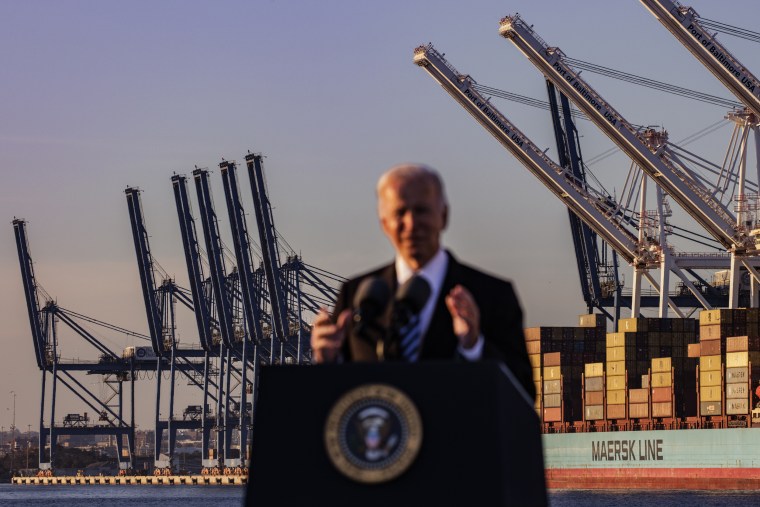The American economy is hotter than it's been in more than 20 years. Unemployment is just 4.2 percent, lower than it ever got during Barack Obama’s presidency, and 6.1 million jobs have been created just from January through November. Growth is also surging: As The Wall Street Journal reported, analysts expect a 7 percent annualized growth rate in the last quarter of 2021 — a rate better than Europe and even China.
The ongoing economic disruptions, the hypnotizing power of right-wing media and the Democrats' own communication woes have something to do with it.
Yet contrary to all political conventional wisdom, President Joe Biden is getting no credit for it. Not only is his approval rating stuck in the low 40s, Gallup's Economic Confidence Index was also recently measured at minus 33 — matching the initial stage of the pandemic, when jobs were vanishing by the millions and the Federal Reserve barely managed to stave off a global financial crisis.
It's a mysterious situation. But the ongoing economic disruptions, the hypnotizing power of right-wing media and the Democrats' own communication woes have something to do with it.
First, despite all the good news in the economy, not all is well. Thanks to the pandemic and fragile supply chains resulting from a previous decade of under-investment, there are shortages of many important goods — particularly cars, where production is still in the toilet thanks to the computer chip shortage — and inflation is at its highest point in decades. People like jobs, but they don't like rising prices. By the same token, unemployment is low, but the total number of jobs is still several million short of where it was in 2019; many people probably would like to work but can't because of the ongoing pandemic.
Meanwhile, we're entering another grim pandemic winter, and though the omicron wave taking hold across the country will hopefully be less murderous thanks to possible lessened severity and increased population-wide immunity, it's still going to be hard on hospitals. Parents are struggling with child care, people may fear going to work, others may end up sick and so on.
In short, the economy doesn't feel nearly as good as 4 percent unemployment should feel.
The second factor is partisanship. The University of Michigan conducts a survey on consumer sentiment broken out by party, which shows a truly staggering gap between the two — a relatively recent development, incidentally. Since Biden won the election, Republican attitudes on the economy have soured to the point where they register worse consumer sentiment than at the pit of the Great Recession in early 2009.
Republicans are more biased in both directions these days: ecstatic when their guy was in office and operatically pessimistic now that he's not.
Now, there is often some partisan bias in economic views. Democrats were quite upbeat about the economy during the Obama years and less positive during the Trump administration. But Republicans are more biased in both directions these days: ecstatic when their guy was in office and operatically pessimistic now that he's not. Say what you like about economic problems today, things are categorically better than they were in March 2009 — and it's a safe bet that no matter how great the economy was going, Tucker Carlson and Ben Shapiro would convince conservatives they were trapped in the worst of all possible nightmare hells.
The awesome power of right-wing propaganda also demonstrates the complete lack of anything similar on the left. Neither liberals nor leftists have anything even remotely close to the communications machine that conservatives possess. AsAlex Pareene wrote at The New Republic, what Democrats typically prefer to do is scold the mainstream media for not covering the issues in a way they would prefer. While those complaints are very often justified, it plainly has not worked at correcting even inexcusably blatant media biases (witness how they hounded Biden for ending the occupation of Afghanistan) much less countering the power of the right.
Obviously it would not be ideal for Democrats to construct a propaganda megaphone that was exactly like the Republican one, only in reverse — able to convince liberal base voters on cue of whatever the party found politically convenient to believe. But they could be communicating better — Biden, in particular. For the past year, he has preferred to keep a low profile and avoid instant commentary on daily events. What does come out of the White House is typically very scripted and cautious. The theory apparently was that Americans would prefer a more quiet, professional president after four years of Donald Trump's deranged extremism. That's plausible, but it plainly isn't working.
It would be wiser to take some cues from the former president. For all his manifest defects as a politician and a human being, Trump had many sound political instincts. For one thing, he knew the value of distraction: If something isn't going well, he would push it off the front page by doing something outrageous. For another, he knew the value of constant boasting. A solid economy or some new policy will not automatically translate into support; people also have to be reminded that they happened, preferably over and over. (This is why the New Deal projects back in the 1930s had plaques plastered all over them.)
Biden doesn't have to feud with Bette Midler, but he could be drumming up a lot more support for his policies than he currently is. If he doesn't, or if his party doesn't figure out a better way to get its message in front of voters than yelling at Maggie Haberman, then I fear his approval rating will remain down in the doldrums no matter how good the economy gets.
